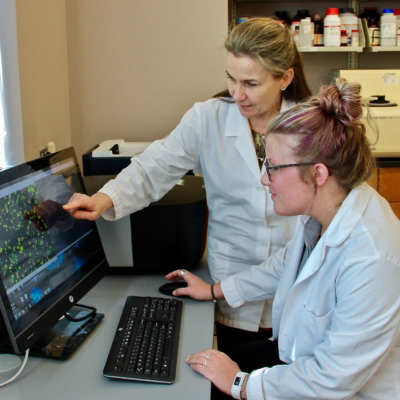The UNC Nutrition Research Institute is an internationally recognized center that conducts innovative basic and translational science studying how individual differences in requirements and responses to diet affect our nutritional needs. Using cutting-edge tools in precision nutrition, our scientists research the role of nutrients in preventing or mitigating the negative effects of chronic diseases and aging, and in improving human development, even before conception.
As experts in the field, NRI scientists are often cited or quoted in the news media. Recent features include the following.
Natalia Krupenko, PhD, associate professor of Nutrition in The ABCs of Vitamin B for aarp.org, July 21, 2022.
Older adults who take folic acid supplements may be at increased risk of cancer, particularly prostate cancer, researchers are discovering.
Popping folic acid supplements “is not as benign as people thought,” says Natalia Krupenko, a nutritional scientist at the University of North Carolina, who studies the interaction between folate and cancer. “Try to get it from your food,” she adds. Most supplements tend to contain more than the recommended daily dose of folic acid, according to the NIH.
Carol L. Cheatham, PhD, associate professor of Psychology and Neuroscience in Blueberries really ARE a superfood! Study finds eating the fruit every day can reverse cognitive decline in elderly people for DailyMail.com, September 21, 2022.
Dr. Carol Cheatham, an associate professor, psychology & neuroscience at UNC who led the research explained to DailyMail.com that this study specifically used wild blueberries from Maine.
Phytochemicals in the berries have evolved defenses from skin cancer, pests and other elements in the harsh northeastern environment.
As a result, these phytochemicals are rich in chemicals that are great for a person’s cognitive health.
Deborah Tate, PhD, professor of Nutrition in The Science-Backed Strategies That Will Actually Help You Eat Better for Wall Street Journal, September 28, 2022.
Whether you are trying to overhaul your diet, resist the peanut-butter cups in the checkout aisle or maintain the good habits you already have, research suggests some ways to make healthy eating easier. . . .
Making a shopping list of healthful foods can encourage you to avoid impulse buys when you are at the store, says UNC’s Dr. Tate.
Shopping for groceries online might be even more effective since unhealthy items aren’t right in front of you.

